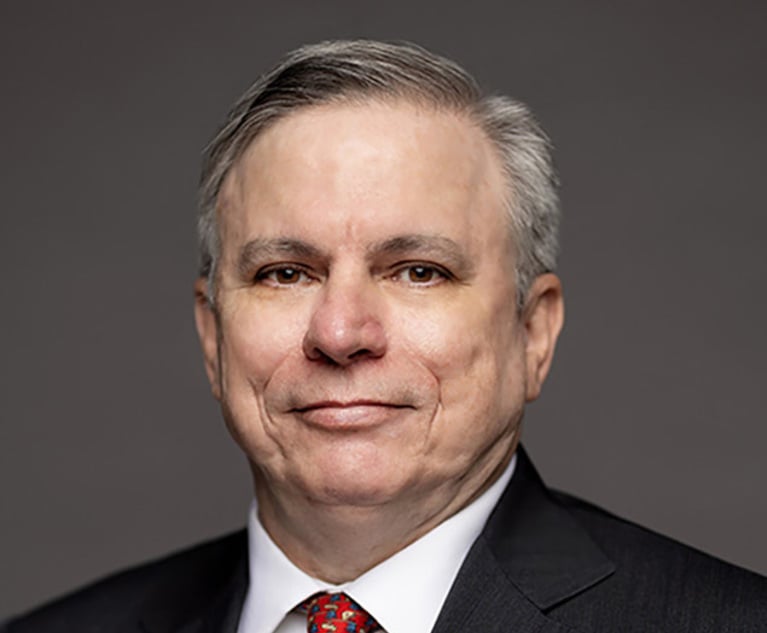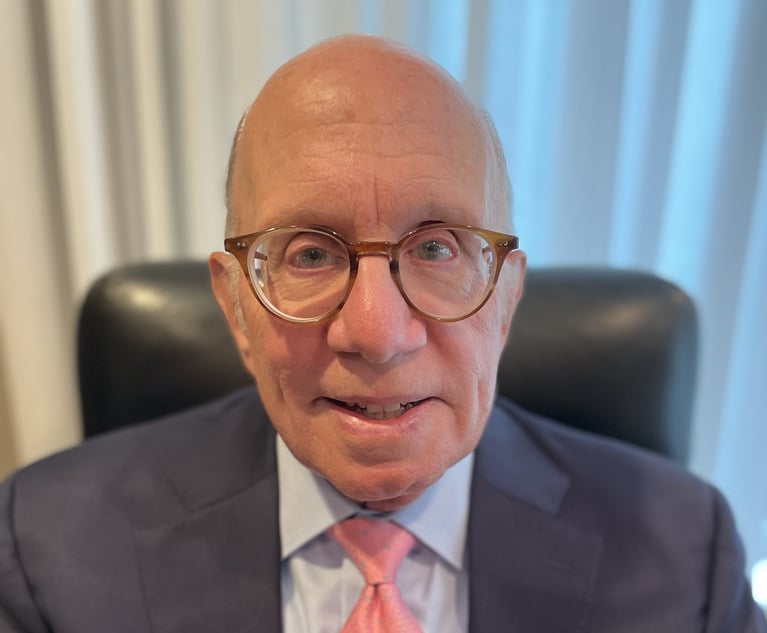 Joel Cohen
Joel CohenWhen a 'Would-Be' Client Foolishly Relies on an Attorney
To be clear, we, all of us, must take to the grave anything the would-be client tells us, even if he never gives us that historically formulaic dollar bill (or peppercorn), and drops us from consideration the moment he walks out of our office casually saying, "I'll be in touch."
May 28, 2020 at 10:45 AM
7 minute read
Alan Tucker is a local lawyer in the Satilla Shores neighborhood of Brunswick, Ga. Unless you've been closely following the bizarre story of the February 23 murder of Ahmaud Arbery and its aftermath, you've never heard of Tucker.
As you may have heard, Arbery was a black man who was jogging down a quiet, tree-lined street—likely where, in the view of some, he "didn't belong"—and was seemingly shot at point blank range by Gregory McMichael (a retired cop) and his son, Travis, apparently for no good reason.
A couple hundred feet behind, William "Roddie" Bryan, also for no reason (that he's been willing to explain), was following Arbery in his car and curiously videotaping the jog, and the shooting that killed him. The video was apparently turned over by Bryan to the local police, and somehow the McMichaels also received a copy of it. Why? Not clear. Anyone, however, objectively looking at the videotape would see it as extremely incriminating of the McMichaels. Bryan has since been arrested for somehow participating in the murder. Hard to understand that.
For several months the police and local prosecutors dilly-dallied over the case—seemingly accepting the good old boys McMichaels' claim that Georgia's "stand your ground" defense somehow absolved them. Although it's not precisely clear when the police saw the video (although it seems to have been early on), at some point over the continuum it became public. And that's the real point of this story. The McMichaels spoke to Tucker, and he gave it to a local radio station that posted it, after which it went viral. And after that, and presumably because of that, new, more objective, prosecutors came into the picture and the McMichaels were finally charged with murder.
So, here are the real questions: Why did Tucker make the video public? Did he think it was helpful to the McMichaels, or for some other reason? Was he acting as the McMichaels' lawyer when he spoke to them and received the tape, or was he just a friend giving "casual, friendly" advice? Did the McMichaels authorize Tucker to make the tape public—whether he was, by then, acting in any way as their lawyer or not? And could they have possibly thought, collectively, that the tape was good for the McMichaels?
It's not terribly important to this discussion whether the McMichaels themselves thought that a publicized tape would be helpful to their cause. More important is, what was the relationship between them and Tucker? Undoubtedly, the fact that Tucker is a lawyer is presumably the reason why they reached out to him and pivotal to them.
Likely, of course, there was no retainer agreement between them at the time (or ever), and we, as lawyers, know that a "formal" retention is hardly a sine qua non to the existence and confidentiality demands of an attorney-client relationship. Would-be clients come to us all the time and tell their stories in anticipation of possibly retaining us. Some, more sophisticated or maybe more paranoid than others, pointedly ask "is this discussion confidential," but many don't—although we, as the professionals in the equation, should listen to their stories fully intending that their disclosures are being received, and will remain, in utter confidence. To be clear, we, all of us, must take to the grave anything the would-be client tells us, even if he never gives us that historically formulaic dollar bill (or peppercorn), and drops us from consideration the moment he walks out of our office casually saying, "I'll be in touch."
So, again, it's hard to know if the McMichaels were intending that Tucker was going to act as their lawyer in disclosing the tape; hard to know if they authorized it; but especially hard to know precisely what Tucker was trying to accomplish. Did he think that making the tape public would "lower the temperature" in Brunswick that might have been building in town against the McMichaels, as he says, especially given the cross-racial nature of the killing?
Or was Tucker, for his own selfish purpose, trying to pay a debt to a journalist to whom he "owed" something—not in any way reported in this case, but certainly not unheard of in the business. Surprisingly, while Tucker's public statements about why he disclosed the tape have changed over time, Tucker went out of his way to issue a press release saying that he wasn't going to represent anyone in the case, whereas he had previously said that his purpose in releasing the tape under a pledge of anonymity from the radio station was to level the playing field in the public's appreciation of what truly happened—"just the facts, ma'am." Or, as he put it, he did it out of "pride in the community that was being ripped apart by erroneous accusations and assumptions." The latter, hardly a justifiable reason either—Tucker should have had loyalty to only the McMichaels (however undeserving they may seem to have been given their seemingly cold blooded murder of an unarmed black man).
But where were the McMichaels in any of these decisions by Tucker? Tucker's mantra, as he put it, was "If we tell the truth, we get justice." Indeed, as far as the McMichaels are concerned, however, a better strategy would likely have been to remain silent and keep out of the public domain to the extent possible.
Needless to say, the McMichaels/Tucker facts are largely sui generis—after all, which attorney in his right mind ever took it upon himself, or even accepted such a self-defeating authorization from would-be clients, to splash on the public record something so obviously incriminating to them? Still, the curious fact pattern provides a teachable moment about how cautious we must all be when a "client"—who, perhaps technically, is not quite a client—has spoken to us, and the client (or we) decides, as they say, "to go in another direction."
Clients or would-be clients often don't know better, and we're obliged as professionals to fully explain the lay of the land. And even if they haven't formally retained us, they have reason to believe that we're going to be as professionally responsible and discreet, as if they're fully signed up with the retainer check already cleared in our bank account.
Lastly, it's not totally clear how Tucker received the tape—from the McMichaels or some third party, maybe indirectly from a police officer sympathetic to the McMichaels. The decision to make the tape public didn't really depend on how Tucker got the tape. Unless Tucker had made totally clear when he met with the McMichaels that he was not acting as their lawyer and just as a friend, he had an affirmative ethical duty to refrain from releasing information harmful to the McMichaels, even if he never received the tape from them but as a result of that attorney-client relationship of sorts.
A lawyer's ethical duty regarding confidentiality is generally far broader than a client's attorney-client privilege—he can't disclose things "embarrassing" or "potentially detrimental" to the client, without "informed consent" from the client, even if he didn't receive such information from the client. See generally Georgia Rules of Professional Conduct 1.6, not meaningfully different from New York's Rule 1.6. See also New York Rule 1.18 which is somewhat more detailed than Georgia's rules regarding an attorney's duties to "prospective" clients, and would have specifically precluded disclosure of information (i.e., the tape) if received from the prospective client even if no formal attorney-client relationship ensued—although that wouldn't have made a difference in this case.
If Tucker wasn't previously aware of these truths—he seems to say that he's all about truth—then he should certainly learn about that for the future.
Joel Cohen, a former state and federal prosecutor, practices white collar criminal defense law as senior counsel at Stroock & Stroock & Lavan. He is an adjunct professor at both Fordham and Cardozo Law Schools and the author of "I Swear: The Meaning of An Oath" (Vandeplas Publ. 2019).
This content has been archived. It is available through our partners, LexisNexis® and Bloomberg Law.
To view this content, please continue to their sites.
Not a Lexis Subscriber?
Subscribe Now
Not a Bloomberg Law Subscriber?
Subscribe Now
NOT FOR REPRINT
© 2024 ALM Global, LLC, All Rights Reserved. Request academic re-use from www.copyright.com. All other uses, submit a request to [email protected]. For more information visit Asset & Logo Licensing.
You Might Like
View All
Patent Trolls Come Under Increasing Fire in Federal Courts

Why Is It Becoming More Difficult for Businesses to Mandate Arbitration of Employment Disputes?
6 minute readLaw Firms Mentioned
Trending Stories
- 1Weil Advances 18 to Partner, Largest Class Since 2021
- 2People and Purpose: AbbVie's GC on Leading With Impact and Inspiring Change
- 3Beef Between Two South Florida Law Firms Deepens With Suit Over Defamation
- 4Judge Skips Over Sanctions in Talc Bankruptcy: 'That’s A No'
- 5Hit by Mail Truck: Man Agrees to $1.85M Settlement for Spinal Injuries
Who Got The Work
Michael G. Bongiorno, Andrew Scott Dulberg and Elizabeth E. Driscoll from Wilmer Cutler Pickering Hale and Dorr have stepped in to represent Symbotic Inc., an A.I.-enabled technology platform that focuses on increasing supply chain efficiency, and other defendants in a pending shareholder derivative lawsuit. The case, filed Oct. 2 in Massachusetts District Court by the Brown Law Firm on behalf of Stephen Austen, accuses certain officers and directors of misleading investors in regard to Symbotic's potential for margin growth by failing to disclose that the company was not equipped to timely deploy its systems or manage expenses through project delays. The case, assigned to U.S. District Judge Nathaniel M. Gorton, is 1:24-cv-12522, Austen v. Cohen et al.
Who Got The Work
Edmund Polubinski and Marie Killmond of Davis Polk & Wardwell have entered appearances for data platform software development company MongoDB and other defendants in a pending shareholder derivative lawsuit. The action, filed Oct. 7 in New York Southern District Court by the Brown Law Firm, accuses the company's directors and/or officers of falsely expressing confidence in the company’s restructuring of its sales incentive plan and downplaying the severity of decreases in its upfront commitments. The case is 1:24-cv-07594, Roy v. Ittycheria et al.
Who Got The Work
Amy O. Bruchs and Kurt F. Ellison of Michael Best & Friedrich have entered appearances for Epic Systems Corp. in a pending employment discrimination lawsuit. The suit was filed Sept. 7 in Wisconsin Western District Court by Levine Eisberner LLC and Siri & Glimstad on behalf of a project manager who claims that he was wrongfully terminated after applying for a religious exemption to the defendant's COVID-19 vaccine mandate. The case, assigned to U.S. Magistrate Judge Anita Marie Boor, is 3:24-cv-00630, Secker, Nathan v. Epic Systems Corporation.
Who Got The Work
David X. Sullivan, Thomas J. Finn and Gregory A. Hall from McCarter & English have entered appearances for Sunrun Installation Services in a pending civil rights lawsuit. The complaint was filed Sept. 4 in Connecticut District Court by attorney Robert M. Berke on behalf of former employee George Edward Steins, who was arrested and charged with employing an unregistered home improvement salesperson. The complaint alleges that had Sunrun informed the Connecticut Department of Consumer Protection that the plaintiff's employment had ended in 2017 and that he no longer held Sunrun's home improvement contractor license, he would not have been hit with charges, which were dismissed in May 2024. The case, assigned to U.S. District Judge Jeffrey A. Meyer, is 3:24-cv-01423, Steins v. Sunrun, Inc. et al.
Who Got The Work
Greenberg Traurig shareholder Joshua L. Raskin has entered an appearance for boohoo.com UK Ltd. in a pending patent infringement lawsuit. The suit, filed Sept. 3 in Texas Eastern District Court by Rozier Hardt McDonough on behalf of Alto Dynamics, asserts five patents related to an online shopping platform. The case, assigned to U.S. District Judge Rodney Gilstrap, is 2:24-cv-00719, Alto Dynamics, LLC v. boohoo.com UK Limited.
Featured Firms
Law Offices of Gary Martin Hays & Associates, P.C.
(470) 294-1674
Law Offices of Mark E. Salomone
(857) 444-6468
Smith & Hassler
(713) 739-1250








